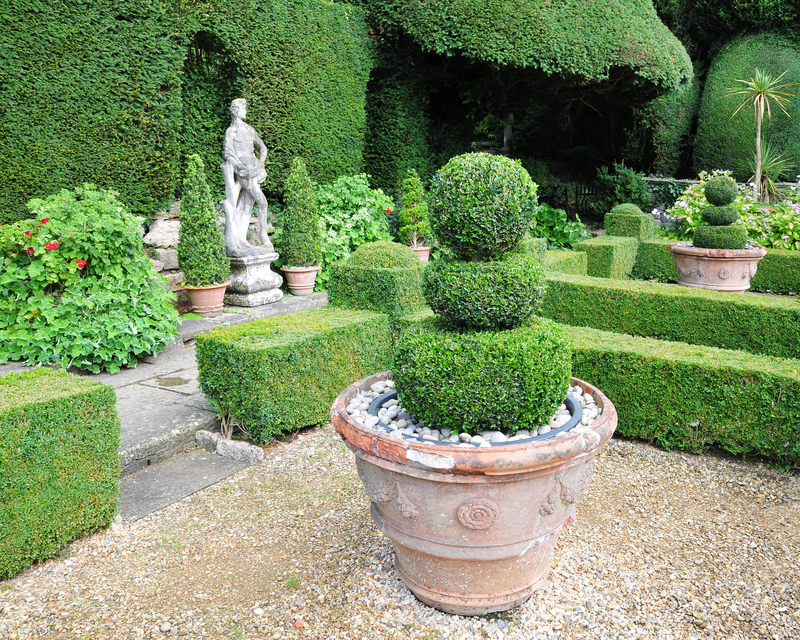Zen Garden Concepts for Your Peaceful Outdoor Oasis
Posted on 24/06/2025
Zen Garden Concepts for Your Peaceful Outdoor Oasis
Are you yearning to transform your backyard into a haven of tranquility? Zen garden concepts offer a sophisticated solution, blending natural elements with minimalist principles to create a peaceful outdoor oasis. Derived from ancient Japanese traditions, Zen gardens--also known as Japanese rock gardens or "karesansui"--invite contemplation, relaxation, and connection with nature. In this comprehensive guide, we'll explore innovative Zen garden ideas, essential design elements, and step-by-step tips to craft your own serene outdoor retreat.

What Is a Zen Garden?
At their core, Zen gardens are stylized landscapes composed of rocks, sand, gravel, and carefully chosen greenery. These gardens encapsulate the essence of nature with minimalist features and an arrangement that encourages meditation. By fostering harmony between humans and the environment, a Zen-style outdoor oasis serves as a spiritual escape from the rigors of daily life.
Core Elements of a Peaceful Zen Garden
- Rocks and Stones: Symbolize mountains or islands, used as focal points.
- Sand and Gravel: Represent water or rippling waves, often raked into artistic patterns.
- Water Features: Real or implied water, such as ponds, bubbling urns, or patterns symbolizing rivers.
- Moss and Minimalist Plants: Emphasize simplicity and evergreen tranquility.
- Bridges, Pathways, and Bamboo Fences: Direct movement and frame the garden's design.
Designing Your Zen Garden Oasis: Essential Concepts
Creating a peaceful outdoor sanctuary with Zen garden concepts revolves around careful planning and intentional symbolism. The following sections detail key principles and creative ideas to inspire your personalized retreat.
1. Embrace Minimalism and Asymmetry
A classic Zen-style garden embraces minimalism, where every element has meaning and nothing feels superfluous. Unlike Western gardens, asymmetry is valued; rocks, shrubs, and sand are thoughtfully arranged in irregular groupings. This fosters a naturalistic feel and avoids rigid, formal lines.
- Tip: Start with an odd number of rocks or boulders, grouping them off-center to promote organic flow.
- Tip: Leave open spaces as a reminder of simplicity and the beauty of emptiness.
2. Use Sand and Gravel to Evoke Calmness
The signature feature of a Japanese Zen garden is raked sand or gravel, representing water and fluidity. Patterns--such as ripples or concentric circles--are carefully crafted to encourage mindfulness. Raking becomes a meditative practice, inviting present-moment awareness as you maintain your tranquil oasis.
-
Raking Ideas:
- Straight lines: Evoke river currents or inner peace.
- Swirls and circles: Suggest pools or eddies, symbolizing the continuity of life.
- Zig-zag paths: Illustrate journey and transformation.
- Pro Tip: Use a wooden or metal rake for distinct patterns. Refresh the designs periodically to renew energy.
3. Incorporate Water Elements for Serenity
Real or symbolic water features are central to peaceful Zen garden concepts. While some Zen gardens forgo actual water in favor of representational gravel "rivers," others integrate koi ponds, small waterfalls, or bamboo fountains (shishi-odoshi). The gentle sound of water soothes the senses and amplifies your outdoor sanctuary's relaxing effect.
- Mini Ponds: Add aquatic plants or ornamental fish to highlight the cycle of life.
- Bubbling Rocks: Create soft, ambient soundscapes that mask urban noise.
- Zen-inspired Birdbaths: Attract wildlife while blending seamlessly with minimalist design.
4. Select Plants That Reflect Tranquility
Unlike lush Western gardens, a Zen-inspired outdoor space favors sparse planting with carefully chosen species. Plants are selected for their shape, color, and evergreen nature, fostering year-round calmness.
- Moss: A classic symbol of age and tranquility. It thrives in shaded, moist conditions.
- Bamboo: Represents strength and flexibility. Use for screens, accents, or subtle movement in the wind.
- Japanese Maples: Add a pop of seasonal color and graceful structure.
- Ferns and Grasses: Provide calm, green textures without overwhelming the design.
- Evergreen Shrubs (e.g., azaleas, boxwood): Anchor the garden's year-round appearance.
Creative Zen Garden Ideas for Every Outdoor Space
Your outdoor oasis can be tailored to any landscape, from expansive backyards to compact balconies. These Zen garden ideas showcase how you can incorporate serenity and style, no matter the available space.
Small Space Zen Retreats
- Balcony Zen Garden: Arrange a shallow sand tray, a few river stones, and a compact bamboo fountain for instant tranquility outside your apartment window.
- Miniature Tabletop Zen Gardens: Perfect for meditation nooks or desktop relief. Use sand, small rocks, and a tiny rake for mindfulness breaks.
- Courtyard Zen Hideaway: Enclose a small courtyard with bamboo fencing, add decorative gravel, and frame the view with a sculptural tree like Japanese maple.
Traditional Japanese Zen Gardens
- Karesansui (Dry Landscape Garden): Emphasize rocks, gravel, and sparse plants for a meditative, minimalist masterpiece.
- Tsukiyama (Hill Garden): Create miniature hills, winding paths, and ponds to recreate natural scenery on a smaller scale.
- Roji (Tea Garden): Incorporate stone pathways, lanterns, and a simple bamboo gate for a traditional tea ceremony approach.
Modern Zen Garden Concepts
- Urban Zen Garden: Merge contemporary outdoor furniture, LED lighting, and free-form stonework for chic, city-friendly serenity.
- Zen Meditation Pod: Dedicate a small area for yoga or meditation, bordered by low-maintenance groundcovers, rocks, and minimalist benches.
- Water-Wise Zen: Incorporate drought-tolerant plants, permeable gravel, and stone accents to achieve sustainability with style.
How to Create Your Own Zen Garden: Step-by-Step Guide
Ready to bring your Zen garden concepts to life? The following steps will guide you through design, material selection, and installation for a harmonious outdoor retreat.
Step 1: Choose the Location
- Pick a spot that offers privacy and natural light. Gardens can range from a dedicated backyard zone to a corner patio or balcony.
- Consider views from inside your home--an exterior Zen oasis doubles as calming focal scenery.
Step 2: Plan Your Layout
- Sketch your design, positioning rocks, sand areas, water features, and pathways.
- Leave negative space intentionally; less is more in Zen garden philosophy.
- Factor in seating zones for meditation or quiet contemplation.
Step 3: Select Materials Mindfully
- Rocks or boulders: Choose varied shapes and natural tones for authenticity.
- Sand or gravel: White or grey varieties best evoke water. Coarse grades hold raked patterns longer.
- Plants: Opt for moss, bamboo, or evergreens. Avoid busy, flowering varieties.
- Extras: Consider stone lanterns, bamboo gates, or subtle lighting.
Step 4: Prepare the Foundation
- Clear the site and level the ground if necessary.
- Add a weed barrier beneath gravel or sand for easy long-term care.
- Edge the area with stone, wood, or bricks for definition.
Step 5: Place Rocks and Hardscape Features
- Begin with the largest rocks, placing them off-center in asymmetrical clusters.
- Sink boulders partially for a natural "grown out of the earth" look.
- Add bridges or stepping stones for movement and symbolic pathways.
Step 6: Add Sand, Gravel, and Rake Patterns
- Pour a 2-3 inch layer of gravel or sand, spreading evenly across the ground.
- Use a rake to create calming patterns around rocks and plants.
- Maintain your patterns routinely for mindfulness practice.
Step 7: Plant Thoughtfully and Accessorize
- Add moss or low-maintenance groundcovers in shadier spots.
- Plant bamboo or ferns sparingly as visual anchors.
- Enhance with stone lanterns, benches, or gently bubbling water features for added relaxation.
Step 8: Care and Mindful Maintenance
- Remove leaves and debris regularly to preserve the tranquil ambiance.
- Refresh raked patterns as needed--this task doubles as meditative self-care.
- Prune plants to maintain clean lines and open spaces.
Benefits of a Zen Garden Outdoor Oasis
Transforming your yard into a Zen-inspired outdoor retreat yields numerous benefits beyond aesthetic appeal. These include:
- Stress Reduction: The minimalist environment, soothing patterns, and calming greenery provide a retreat from daily anxiety.
- Mindfulness and Meditation: Repetitive raking, quiet observation, and gentle water sounds enhance awareness and present-moment focus.
- Low Maintenance: Sparse planting and hardscaping reduce the need for intensive gardening effort.
- Connection to Nature: Zen garden concepts celebrate nature's beauty with subtlety and reverence--no matter your available space.
- Enhanced Home Value: Thoughtful landscape design creates curb appeal and a memorable outdoor living area.

Frequently Asked Questions About Zen Garden Concepts
- Do Zen gardens require a lot of maintenance?
Not at all. A core advantage of Zen-inspired garden ideas is minimal upkeep. Most tasks involve raking, debris removal, and occasional plant pruning. - Can I create a Zen garden if I only have a small space?
Absolutely! Many Zen garden concepts are specifically designed for compact patios, balconies, or even tabletops. - What materials work best for sand or gravel areas?
Crushed granite, pea gravel, or whitewashed play sand are popular. Choose a texture that holds raked lines for the longest time. - Are water features necessary?
They are optional. Symbolic "dry" water using gravel is common, but real water adds sensory appeal if space and budget allow. - What plants are most Zen-like?
Moss, bamboo, Japanese maples, boxwood, ferns, and certain ornamental grasses are classic choices. Limit bright flowers and dense plantings.
Conclusion: Turn Your Backyard into a Zen Oasis
By integrating Zen garden concepts into your outdoor space, you can cultivate a peaceful retreat that nurtures both mind and spirit. Whether you design a sprawling rock garden or a compact meditation nook, the principles of simplicity, mindfulness, and natural harmony will enrich your environment--and your life.
Ready to create your own peaceful outdoor oasis? Let nature's elements and Zen wisdom guide your journey toward tranquility, right in your own backyard.



